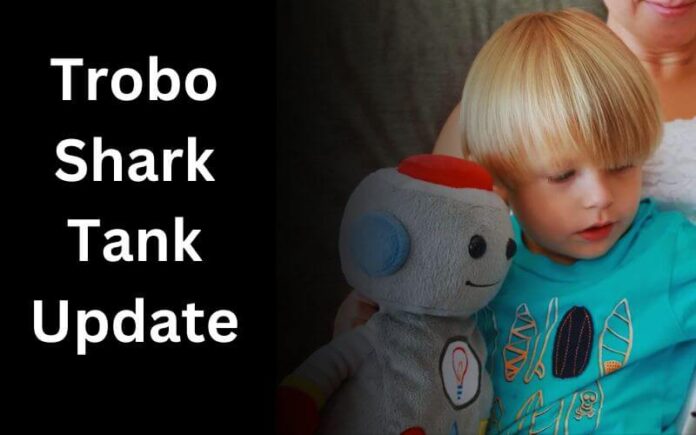In the world of educational toys, few products have captured the imagination quite like Trobo. This innovative plush toy robot, designed to foster STEM learning in children, made a memorable appearance on Shark Tank Season 7. Despite securing a deal with Robert Herjavec, Trobo’s journey was not without its challenges. In this blog post, we’ll take a closer look at the rise and fall of Trobo, and what it means for the future of educational toys.
The Trobo Pitch and Deal at Shark Tank
Trobo was the brainchild of Jeremy Scheinberg and Chris Harden, two engineers, and fathers who wanted to create an engaging educational toy for their children. The toy itself was a plush robot that could be paired with an app to provide kids with interesting facts and stories in a fun, interactive way.
When Jeremy and Chris appeared on Shark Tank, they sought $100,000 for 10% equity in their company. The sharks were initially intrigued by the product, but concerns about its high price point ($59.95) and potential lack of interest from major retailers led most of them to back out.
However, Robert Herjavec saw potential in Trobo as a content delivery tool. He offered the creators $166,000 for 33.3% equity, contingent on securing a deal with a major content provider like Dreamworks. Jeremy and Chris accepted the offer and left the tank with high hopes for their product.
Trobo Is Gone Out of Business
Despite the initial excitement surrounding Trobo, the company ultimately failed to live up to its potential. The deal with Robert Herjavec fell through, and Trobo struggled to gain traction in the highly competitive educational toy market.
Over time, the price of Trobo decreased as the company tried to attract more buyers. However, without a major content deal in place, Trobo was unable to differentiate itself from other educational toys on the market. In 2017, just two years after its Shark Tank appearance, Trobo shut down for good.
What Was Trobo Net Worth?
At the time of its Shark Tank appearance, Trobo was valued at $1 million based on the deal offered by Robert Herjavec. However, with securing additional funding or partnerships, the company was able to sustain itself long-term.
It’s difficult to say exactly what Trobo’s net worth was at the time of its closure, but it’s clear that the company was unable to generate sufficient revenue to stay afloat. The educational toy market is notoriously challenging, with many products struggling to gain traction despite initial buzz.
Business Overview
Trobo’s story is a cautionary tale for entrepreneurs looking to break into the educational toy market. While the product itself was innovative and engaging, the company faced significant challenges in terms of pricing, distribution, and content partnerships.
One of the key issues facing Trobo was its high price point. At $59.95, the toy was significantly more expensive than many other educational toys on the market. This made it difficult for the company to attract budget-conscious parents, especially given the abundance of free or low-cost educational content available online.
Another challenge for Trobo was distribution. While the company had secured some initial orders from small and medium-sized retailers, it struggled to gain traction with larger chains. Without the backing of a major retailer, Trobo found it difficult to reach a wider audience and generate significant sales.
Finally, Trobo’s inability to secure a content partnership with a major player like Dreamworks proved to be a significant obstacle. Access to engaging, high-quality content is necessary for the toy to differentiate itself from other educational products on the market.
Conclusion
The rise and fall of Trobo is a fascinating case study of the challenges facing educational toy startups. While the product itself was innovative and engaging, the company ultimately failed to overcome the significant obstacles it faced in terms of pricing, distribution, and content partnerships.
For entrepreneurs looking to break into this space, the Trobo story offers valuable lessons about the importance of realistic pricing, strong distribution partnerships, and compelling content. By learning from Trobo’s successes and failures, future educational toy makers can position themselves for long-term success in this challenging but rewarding market.
Also Read:
